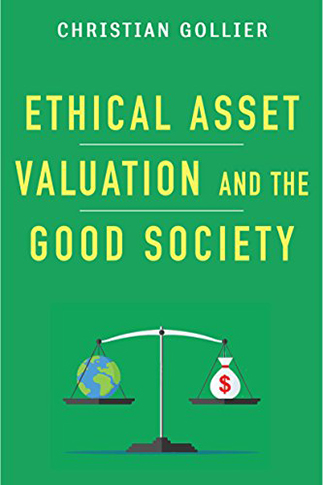Ethical Asset Valuation and the Good Society (Kenneth J. Arrow Lecture Series) by Christian Gollier
Christian Gollier is Vice President of the Toulouse School of Economics in France. He is a recognized scholar on the economics of climate change, having participated in a number of cross-disciplinary studies on that subject, and is regarded as an expert applying macroeconomics to climate change. And he is an economic modeler, preferring explanations that can be quantified, as the book’s quantitative appendices demonstrate.
This book reviews the application of economic theory to the effects of climate change. The gist of his arguments is laid out in a long introduction. The bulk of the book is a refresher on macroeconomics if you have not been around it in a while – or never.
Gollier is very conflicted about environmental preservation, all of which he addresses as a subset of climate change. He wants to lift the “veil of ignorance” from complex decisions in which values conflict. Our long-term future – decades – is both complex and uncertain, so what economic rationale could enable impartial, rational decision making?
Right away, Gollier starts making assumptions. One is, “We expect future generations to be wealthier,” where wealth is defined in material, measurable terms. He cites research that humans are frequently irrational compared with theoretical models used for decisions, and wants to offset that. Then he assumes that most major decisions affecting climate change are investments. That reduces the issue to factoring new social and environmental values into efficient allocation of capital. Gollier can rate investment criteria. He can model the risks of long-term capital allocation. Voila. He’s back on his home field.
Investing assumes a payback with various degrees of risk. Grollier chews up pages defining a risk-free rate of return, which in practice is the 10-year bond rates of a stable government. I looked up a bunch of them. They range from 0.04% in Japan to 10.35% in Brazil. Grollier’s modeling settles in the vicinity of 2% for a risk-free return.
Next is the issue of a risk premium for investing in environmentally regenerating programs. Similar data manipulation concludes that on top of the 2% risk-free rate, one should add a 2.5% risk premium for “long-lasting investment with financial, social, and environmental impacts.” Ergo, an environmental investment should yield a 4.5% return or better.
Grollier defines uncertainty as “fat tails in risk distributions.” In that case invoke the Precautionary Principle, which he interprets for investment purposes as a discount rate being “infinitely negative over all maturities.” If you can’t quantify risk, postpone all decisions that lead to irreversible consequences. In other words, freeze; do nothing.
To deep freeze us, Grollier holds that if we rationally interpret the Precautionary Principle in extreme ambiguity, we will assume that any worst-case scenario is certain. Acting on that would lead us to “annihilate scientific and technical innovation.” Therefore the values that we insert into quantitative decision models have to stay outside the deep freeze.
This review has to conclude that Grollier’s models, and most economic models, fall short. They depend on crucial assumptions that economists are reluctant to give up. These assumptions have gone past their use-by date. They wilt even trying to predict glitches in the present economy, and are useless if nature no longer lets the world work the way it once did. Upend those old assumptions and you enter a different world – a different world to live in, and a different world to model. Maybe we can start with Compression Thinking.
The two books reviewed present an interesting contrast. Ethical Asset Valuation is an attempt to apply old models to rapidly changing circumstances. The Unthinkable is an attempt to discover new insights. As a guide to the future, which one would you pick?

